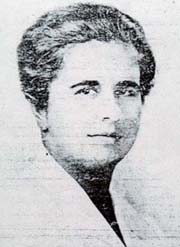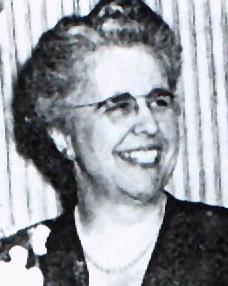
Frances Wayland Wood (February 13, 1903-August 22, 1975) was a lay professional who dedicated her life to liberal religious education. She helped to renovate Unitarian Sunday School materials in the mid-twentieth century and worked as consultant to Unitarian churches across North America.
Wood grew up with deep ancestral roots in Unitarianism and Universalism. The eighteenth-century liberal minister Jonathan Mayhew was an ancestor. Her grandfather, Ebenezer Sumner, helped to found the Universalist Church in Milford, Massachusetts. She grew up in Hopedale, Massachusetts, where the memory of the utopian community founded by the Universalist and Unitarian minister Adin Ballou was still fresh. Asked to name her religion, she wrote, “Unitarian—from Universalist.”
While studying at the New England Conservatory of Music, Frances worked as a volunteer at the Second Unitarian Church of Boston. Here she discovered her “real and true interest” in children and church school education. Accordingly she gave up plans for a career in music and enrolled at the Tuckerman School in Boston, a professional training school associated with the American Unitarian Association for the non-ordained personnel needed by liberal churches. Wood finished her studies in 1926, certified for work as a Parish Assistant (referred to as the “Minister’s Double.”
Wood served as Director of Religious Education at Unitarian churches in Detroit, 1927-38, Chicago, 1961-66 and Dedham, Massachusetts, 1966-68, and as Professor of Religious Education at Meadville/Lombard Theological school, 1961-66. For the greater part of her career, however, 23 years, she worked on the staff of the American Unitarian Association (AUA). In 1938 she was appointed to the newly created position, Field Secretary for the Department of Religious Education of the AUA. Wood and Ernest Kuebler initiated the first meeting of professional directors of liberal religious education which later developed into the Liberal Religious Educators Association (LREDA) in 1949. From 1954-61, she served as Field Secretary for the joint Unitarian and Universalist Council of Liberal Churches (CLC), precursor to the Unitarian Universalist Association, formed in 1961 when the AUA and the UCA (Universalist Church of America) merged.
The vitality of Unitarian and Universalist congregations was at a low ebb in the 1930s. When Wood joined the AUA staff in 1938, she joined a passionate and able team which included her boss, “educational minister” Ernest Kuebler; religious education experimentalist Sophia Fahs; and the President of the AUA, Frederick May Eliot. Later, under the banner of the CLC, they would be joined by the Universalist minister Edna Bruner. Their mission was “to fashion a major overhaul in Unitarian and Universalist religious education.” Among the results of their labors was the New Beacon Series curriculum which helped to revitalize congregations, and thereby launched a period of rapid congregational growth in the 1940s and 50s.
Wood provided administrative oversight for the project and on-site support in the congregations to implement the new curriculum. She also wrote dozens of pamphlets on all aspects of religious education—from worship to teacher training to financing—and many articles for the Christian Register and the Christian Leader. With her writing, she did much to translate the goals of the new curriculum into practical advice to parents and teachers on how to recognize and strengthen a child’s natural reverence, idealism and sense of responsibility.

On her month-long trips across the North American continent, Wood made field visits to individual churches that often lasted three days. During these visits she conducted many interviews, observed church activities, and often preached the sermon on Sunday. “Miss Wood has done a splendid piece of work here,” wrote a grateful minister from Miami whose letter of thanks to the AUA was typical of many.
In her time, women were not encouraged to aspire to ordained ministry, either financially or socially. Wood, nevertheless, devoted her life to and ministered to congregations, their children and their teachers, by the thousands. Further, her presence as a woman ministering to dozens of congregations, served to blaze a trail for women into professional ministry.
Wood attended the Unitarian summer camp at Isle of Shoals, New Hampshire—now Star Island—as a child and later as a religious professional, when she coordinated many of the religious education conferences. She is fondly remembered by Star Island visitors, sitting on the porch, singing with her beautiful voice “Good bye, Sweet Day” to the setting sun.
Sources
Some correspondence of Frances Wood, her reports to the AUA, and materials relating to the Tuckerman School are kept at the Andover-Harvard Theological Library in Cambridge, Massachusetts. Meadville/Lombard Theological School in Chicago, Illinois has a collection of Wood’s pamphlets. A few of Wood’s personal letters and papers are in the possession of the author. The author has also taken oral history from relatives and contemporaries of Wood, including Wood’s niece, Frances Mayhew Wood Hard. Among the many pamphlets that Wood wrote for the AUA are Do’s and Don’ts concerning the organization of church school groups (n.d.), So You are Concerned with Children’s Worship (n.d.), Money Plays a Part in the Child’s Religious Education (n.d.), Even the Smallest of These, Opportunities for the Small Church School (1941), and Church School Teachers!! Where Can We Find Them? How Should We Enlist Them? How Shall We Guide Them? (1955).
The text of the song “Good bye, Sweet Day” is by the Unitarian poet Celia Thaxter.
Article by Jeanne Lloyd
Posted August 25, 2000